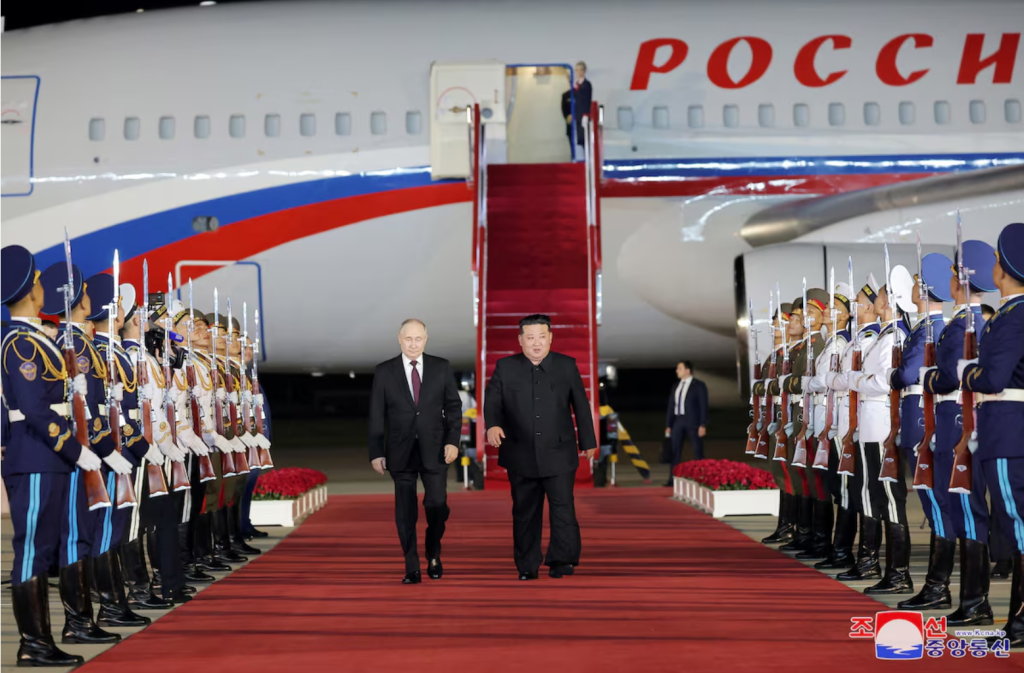
Cheering crowds and lavish ceremonies greeted Russian President Vladimir Putin in Pyongyang on Wednesday, where North Korean leader Kim Jong Un expressed “full support” for Russia’s war in Ukraine and pledged stronger strategic ties with Moscow.
An honour guard including mounted soldiers, and a large crowd of civilians gathered at the Kim Il Sung square by the Taedong River running through the capital, video broadcast by Russian media showed. The scene included children holding balloons, and giant portraits of the two leaders with national flags adorning the square’s main building.
Kim and Putin then rode to the Kumsusan Palace for summit talks.
“We highly appreciate your consistent and unwavering support for Russian policy, including in the Ukrainian direction,” Russian state news agency RIA quoted Putin as saying at the start of the talks.
Putin said Moscow is fighting the hegemonic, imperialist policy of the United States and its allies, Russian media reported.
Kim said North Korea-Russia relations are entering a period of “new high prosperity”.
“Now the situation in the world is becoming more complicated and changing rapidly. In such a situation, we intend to further strengthen strategic communication with Russia, with the Russian leadership,” Kim said.
North Korea “expresses full support and solidarity to the Russian government, army and people in carrying out a special military operation in Ukraine to protect sovereignty, security interests, as well as territorial integrity,” he said.
Putin arrived at Pyongyang’s airport earlier in the day. After Kim welcomed him with an embrace, the two shared “pent-up inmost thoughts” on the ride to the state guest house, North Korean state media said.
Putin is on his first trip to the North Korean capital in 24 years, a visit likely to reshape decades of Russia-North Korea relations at a time when both countries face international isolation.
The countries’ partnership is an “engine for accelerating the building of a new multi-polar world” and Putin’s visit demonstrates the invincibility and durability of their friendship and unity, North Korea’s state news agency KCNA said.
Russia has used its warming ties with North Korea to needle Washington, while heavily sanctioned North Korea has won political backing and promises of economic support and trade from Moscow.
The United States and its allies say they fear Russia could provide aid for North Korea’s missile and nuclear programs, which are banned by U.N. Security Council resolutions, and have accused Pyongyang of providing ballistic missiles and artillery shells that Russia has used in its war in Ukraine.
Moscow and Pyongyang have denied weapons transfers.
Kim greeted Putin, shaking hands, embracing and talking beside the Russian leader’s plane. The pair then rode in Putin’s Russian-made Aurus limousine to the Kumsusan State Guest House.
Likely given the hour, the welcome was a relatively subdued affair, with Kim greeting the Russian leader on the red carpet without the grand ceremony the North put on for Chinese President Xi Jinping on his 2019 visit.
State media photos showed streets of Pyongyang lined with portraits of Putin and the facade of the unfinished and vacant 101-story pyramid-shaped Ryugyong Hotel brightly lit with a giant message “Welcome Putin.”
‘ALTERNATE TRADE MECHANISM’
Wednesday’s agenda includes a gala concert, state reception, honour guards, document signings and a statement to the media, Russia’s Interfax news agency quoted Putin’s foreign policy adviser Yuri Ushakov as saying.
In a signal that Russia, a veto-wielding member of the U.N. Security Council, is reassessing its approach to North Korea, Putin praised Pyongyang ahead of his arrival for resisting what he said was U.S. economic pressure, blackmail and threats.
In an article on North Korea’s official ruling party newspaper, he promised to “develop alternative trade and mutual settlement mechanisms not controlled by the West” and “build an equal and indivisible security architecture in Eurasia.”
Putin’s article implies that there is an opportunity for North Korea’s economic growth within an anti-West economic bloc led by Russia, which is a message that is likely appealing to Kim Jong Un, wrote Rachel Minyoung Lee, an analyst with the 38 North programme in Washington.
“If Pyongyang views Russia as a viable longer-term partner for improving its economy – as irrational as this may seem to some – there is even less of an incentive for it to try to improve relations with the United States,” she said in a report.
Putin also issued a presidential order on the eve of the visit saying Moscow was looking to sign a “comprehensive strategic partnership treaty” with North Korea. Ushakov said it would include security issues.